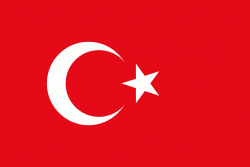Aladağ (Aladağ)
Aladağ, formerly Karsantı, is a small city and a district in Adana Province, Turkey about 100 km north of the city of Adana, up in the mountains. This is an undeveloped area, the people live from agriculture and forestry. People from the Çukurova retreat up here in the summer to escape the heat on the plain, although it's too high up for a day trip.
The Aladağlar mountains are an eastern extension of the Taurus Mountains. These high mountains are a popular area for climbing, usually accessed from the north through the town of Niğde. The town of Aladağ sits on their southern side, accessed by road up from Adana. Approximately 9 kilometers from the settlement of Karsantı / Aladağ is Meydan Kalesi, an impressive castle and chapel constructed during the period of the Armenian Kingdom of Cilicia. This fortresses has three baileys, an array of rounded towers, and a ceremonial hall whose decorations included carved capitals. The fortification was surveyed in 1974 and 1979.
The Aladağlar mountains are an eastern extension of the Taurus Mountains. These high mountains are a popular area for climbing, usually accessed from the north through the town of Niğde. The town of Aladağ sits on their southern side, accessed by road up from Adana. Approximately 9 kilometers from the settlement of Karsantı / Aladağ is Meydan Kalesi, an impressive castle and chapel constructed during the period of the Armenian Kingdom of Cilicia. This fortresses has three baileys, an array of rounded towers, and a ceremonial hall whose decorations included carved capitals. The fortification was surveyed in 1974 and 1979.
Map - Aladağ (Aladağ)
Map
Country - Turkey
 |
|
| Flag of Turkey | |
One of the world's earliest permanently settled regions, present-day Turkey was home to important Neolithic sites like Göbekli Tepe, and was inhabited by ancient civilisations including the Hattians, Hittites, Anatolian peoples, Mycenaean Greeks, Persians and others. Following the conquests of Alexander the Great which started the Hellenistic period, most of the ancient regions in modern Turkey were culturally Hellenised, which continued during the Byzantine era. The Seljuk Turks began migrating in the 11th century, and the Sultanate of Rum ruled Anatolia until the Mongol invasion in 1243, when it disintegrated into small Turkish principalities. Beginning in the late 13th century, the Ottomans united the principalities and conquered the Balkans, and the Turkification of Anatolia increased during the Ottoman period. After Mehmed II conquered Constantinople (Istanbul) in 1453, Ottoman expansion continued under Selim I. During the reign of Suleiman the Magnificent, the Ottoman Empire became a global power. From the late 18th century onwards, the empire's power declined with a gradual loss of territories. Mahmud II started a period of modernisation in the early 19th century. The Young Turk Revolution of 1908 restricted the authority of the Sultan and restored the Ottoman Parliament after a 30-year suspension, ushering the empire into a multi-party period. The 1913 coup d'état put the country under the control of the Three Pashas, who facilitated the Empire's entry into World War I as part of the Central Powers in 1914. During the war, the Ottoman government committed genocides against its Armenian, Greek and Assyrian subjects. After its defeat in the war, the Ottoman Empire was partitioned.
Currency / Language
| ISO | Currency | Symbol | Significant figures |
|---|---|---|---|
| TRY | Turkish lira | ₺ | 2 |
| ISO | Language |
|---|---|
| AV | Avar language |
| AZ | Azerbaijani language |
| KU | Kurdish language |
| TR | Turkish language |















